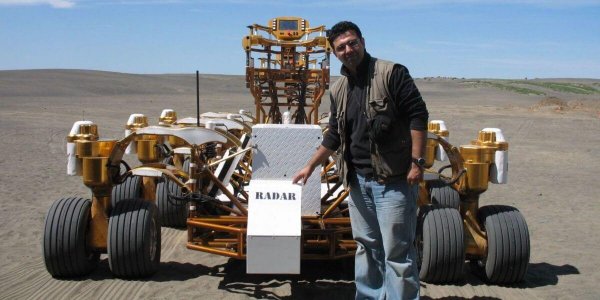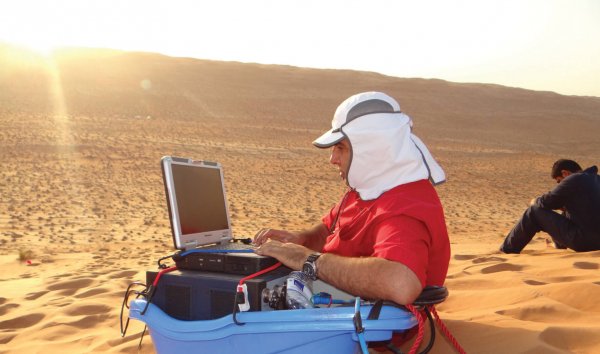What Happens when 100 Million People Run Out of Water?
“In the coming decades, much of the Arabian Peninsula and North Africa may have completely depleted their freshwater aquifers — allwater reserves to support life in a drought could be gone,” said Essam Heggy, a research scientist in the Ming Hsieh Department of Electrical and Computer Engineering at USC Viterbi.
This was the first thing Heggy told me. I had just walked into his office, and my notepad was still in my bag. What followed was one of the most impassioned cases for water education I’ve ever heard. And if you’ve ever lived in Los Angeles, you’ve probably heard a few.
Notice I said water “education,” not conservation. Yes, conservation is hugely important. But Heggy is more concerned with making water science an area that inspires research, students and funding in the same way that something like cancer research does. He understands what he is up against. Most people have experienced cancer in some way on a personal level. Taking an extra-long shower, on the other hand, probably never killed anyone.
Heggy is part of USC Viterbi’s Arid-Climate Water Research Center (AWARE), led by Professor Mahta Moghaddam, also a member of the Department of Electrical and Computer Engineering. AWARE designs tools to understand and mitigate water scarcity. Heggy explores water in the solar system and applies that knowledge right here on Earth.
He put it more eloquently: “Water is like language. You don’t speak it alone, you speak it with others. That’s what looking at other planets and satellites is like: speaking the language of water with our solar system.” These days Heggy isn’t so much speaking the language as he is shouting it.
What happens when Egypt, a country of more than 100 million people, runs out of water?
Heggy asked. This could happen soon, he explained, and the impact would be disastrous. If you think the current refugee crisis — already the largest since World War II — has destabilized the world, you haven’t seen anything yet. A two-year drought in a country with no accessible water table means that lives are seriously threatened.
Heggy’s research was published in the November 2018 issue of the journal Global Environmental Change. According to his findings, three countries in the region — Egypt, Yemen and Libya — are at greatest risk and simply cannot handle the economic impact of the inevitable water shortage. It is unclear how this situation would affect neighboring countries in an already volatile region, but, according to Heggy, in such a severe drought people will migrate — or fight — to survive.
Despite these sobering predictions, people don’t get excited about water studies on Earth. Last year a 12-mile-wide underground lake was discovered on Mars. A vast ocean is believed to exist below the surface of Jupiter’s moon Europa. These types of discoveries make headlines. Yet exactly zero humans live on Mars or Europa. Heggy is trying to change that mindset.
The silver lining is that water stress isn’t necessarily a result of climate change. “Many of the problems we see here are the result of human water mismanagement,” Heggy noted. “To address it, we have to invest in human elements.” That means more than charity programs and relief efforts. It means working to make water science a field that is not only exciting and respected but also better funded.

And what better institution to embrace this field than USC Viterbi — a school devoted to teaching students to use engineering to bring about societal change. A school that just so happens to be one of the largest and best-respected research institutes in the world, and located in an arid environment.
Originally from Egypt, Heggy knows firsthand what an important role water resources play in the conflicts of his homeland. “If we’re ever going to stop fighting over there and build more peaceful communities” he said, “water science must be part of the foundation.”





